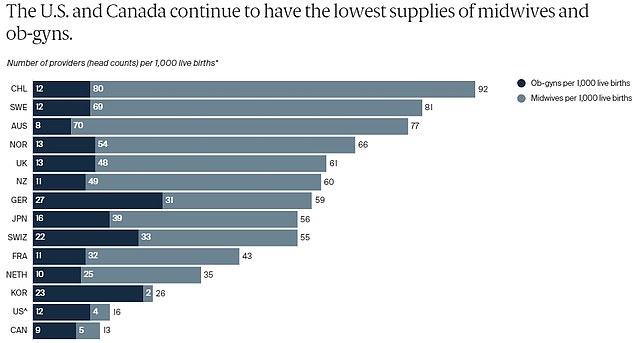Medical experts are concerned about a Florida law that allows non-hospital clinics to perform risky C-sections, which can cause fatal bleeding and problems in future pregnancies.
Gov. Ron DeSantis signed a law in March establishing “advanced birthing centers,” new facilities that will be allowed to perform C-sections in outpatient settings where staff might not be able to mobilize quickly in the event of an emergency or lack the expertise to treat it. with that emergency.
The legislation was heralded as a panacea for the state’s rapidly declining maternity care supply, driven by low federal reimbursement rates for people on Medicaid.
Seventeen birthing centers in Florida hospitals have closed since 2019, turning several parts of the state, especially rural areas, into birthing deserts.
Now, medical experts warn that the procedures should only be performed in hospitals to mitigate the risk of life-threatening bleeding in the mother, infections and problems giving birth in the future. In rare cases, it can also lead to the death of the baby.
Advanced birthing centers will be allowed to perform Caesarean sections, which risk serious bleeding, death and problems with future pregnancies.

Gov. Ron DeSantis signed a law allowing advanced birthing centers to perform C-sections on an outpatient basis without immediate access to hospital care if something goes wrong.
A cesarean birth (cesarean section) is performed by cutting a woman’s uterus to remove the baby. About a third of babies are born this way, but women who undergo this procedure are 80 percent more likely to suffer some type of complication.
Dr. Cole Greves, an Orlando-based perinatologist who chairs the Florida chapter of the American College of Obstetricians and Gynecologists, said KFF Health News : “A pregnant patient who is considered low risk at one time may suddenly need life-saving care at the next.”
He added that new birth clinics, “even with greater regulation, cannot guarantee the level of safety that patients would receive within a hospital.”
Cesarean sections are becoming more common and may seem attractive in part because they can be scheduled, taking the guesswork out of when labor will begin. It may also be a safer option for women who may be at higher risk of complications from a vaginal birth, such as tears in the tissue between the vagina and anus, infection, nerve damage, or excessive bleeding.
But women who take this route risk infection in the lining of the uterus after childbirth, blood loss, reactions to anesthesia, blood clotting, especially in the legs or pelvis, and complications for future pregnancies, such as the attachment of the placenta to the uterus. wall of the uterus.
Mary Mayhew, CEO of the Florida Hospital Association, told DailyMail.com that the organization strongly opposes these clinics, which are “absolutely contrary to the goals we have been working on in collaboration with state agencies” to reduce maternal mortality. .
He added: ‘These new advanced birthing centers will do nothing to address the OB/GYN deserts we have in Florida and the underserved areas of Florida for labor and delivery services.
“And even worse, these advanced birthing centers will likely exacerbate the challenges by potentially taking the OB/GYN and anesthesiologist out of the hospital environment and into these centers.”
Worldwide, women who had C-sections were 80 percent more likely to have complications than those who had a vaginal birth. For women aged 35 and older, the risk of serious complications was almost three times higher, according to the American Action Forum.
Governor DeSantis’ latest move to approve the implementation of outpatient C-section centers will increase the risk of more women experiencing these negative side effects, according to medical experts and leading medical organizations.
Dr. Aaron Elkin, a Florida obstetrician, told the New York Times: ‘The uterus receives 20 percent of the blood that the heart pumps when you are in a full-term pregnancy. Within minutes, you can lose your entire blood supply.
Despite groundbreaking medical innovations, the United States is among the most dangerous places in the world to give birth.
A 2023 study in JAMA found that maternal mortality in the US, defined as death during pregnancy or within a year afterward, more than doubled between 1999 and 2019.
While deaths increased across all racial and ethnic groups, disparities persisted. Black people consistently experienced higher rates of maternal mortality, and American Indian and Alaska Native communities saw a particularly alarming increase, with median rates more than tripling.
Reasons for high maternal mortality range from high rates of pre-existing conditions that make pregnancy risky, such as diabetes and obesity, low access to care, especially in maternity care deserts, and variable quality of care depending on the place where a person lives, up to high rates. from risky medical interventions such as cesarean sections and inadequate postpartum care

The above shows the number of midwives and gynecologists per patient, with the United States having the second lowest number among wealthy nations.
Maternity care in the United States is becoming increasingly scarce because the units are expensive to maintain and have low reimbursement from the federal insurance program.
Staffing shortages have also led to more than 200 hospitals across the country closing labor and delivery units since 2011.
Ms Mayhew said: “We cannot ignore the reality that any service like that, which could potentially move staff away from a 24/7 hospital environment towards these boutique, advanced birth centres, will exacerbate the shortage of health personnel that we are already experiencing. fighting in hospitals.
Women’s Care Enterprises, owned by London-based investment firm BC Partners, lobbied hard for the legislation, according to KFF Health News.
The company will likely benefit from the deal by accepting women with health insurance instead of Medicaid, the government program for poor Americans that the state has not expanded to cover more people.
Dr. Alice Abernathy, assistant professor of obstetrics and gynecology at the Perelman School of Medicine at the University of Pennsylvania, saying: ‘What this appears to be is a poor substitute for quality obstetric care, which in practice is presented as giving people more choice.
“This seems like a bad Band-Aid for a chronic problem that will make outcomes worse rather than better.”


